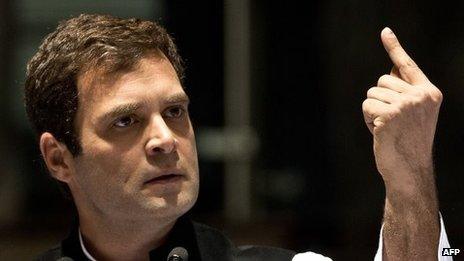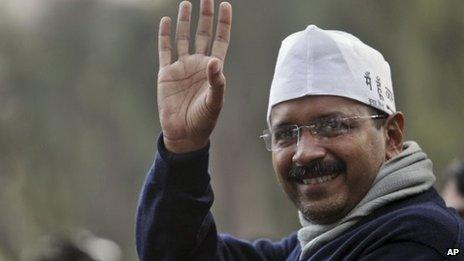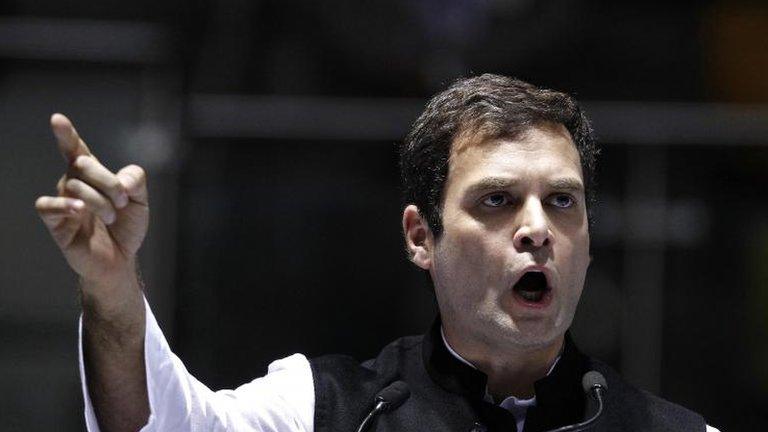Has Rahul Gandhi come of age?
- Published

Rahul Gandhi says he is sure about wanting to change the system, empower women, deepen democracy, open up politics to the young and make India a world-beating manufacturing hub.
That's going by his first formal interview, external on Monday night, a decade after becoming the latest member of the India's fabled Nehru-Gandhi dynasty to enter politics.
What the leader of India's ruling Congress party appeared not to be sure of was how he - and his party - should deal with leaders touched by the taint of corruption or even those who were allegedly involved in the 1984 anti-Sikh riots that happened under the watch of his father, then-Prime Minister Rajiv Gandhi.
"All said and done, that was brave of Rahul Gandhi," tweeted journalist Tunku Varadarajan, external about the 80-minute interview on the Times Now channel. "How many Indian PM candidates have offered themselves up for prime time interview?" (Mr Gandhi will lead the party's campaign in the forthcoming general elections.)
Mr Gandhi even chose India's most aggressive prime-time anchor Arnab Goswami to grill him.
Having said that, the media-shy leader's first proper interview on TV turned out to be a mixed performance.
Platitudes
Mr Gandhi was composed and reasonably articulate - if slightly pedantic - while setting out his vision for much-needed reforms in his party and for India's development.
He was less than impressive when questioned about why his party had failed to crack down on corruption.
He avoided direct comments on his arch rival, , external, the prime ministerial candidate of the Hindu nationalist Bharatiya Janata Party, and the leader of the new anti-corruption party, Arvind Kejriwal, whose Aam Aadmi Party made a spectacular debut in the polls in Delhi and now rules the capital with the minority support of Mr Gandhi's party.
There were also what many say were tired platitudes which couldn't have won Mr Gandhi new admirers. Some examples: "Innocent people dying is a horrible thing"; "Anybody who is corrupt should be punished"; and "women are the backbone of this country". He occasionally lapsed into rhetoric and regurgitated lines.
Mr Gandhi's agenda for development is unexceptionable.
He used the words "empower" and "empowerment" interchangeably 22 times. He mentioned the word "system" - the existing one, which is broken, and the need to change it - 70 times.
He mentioned women - and their key role - 17 times. Many found it a bit odd that he spoke about himself in the third person seven times.
Systemic problem
Mr Gandhi laid the blame on the obvious devil - the system - for all India's ills.
He quite rightly said the system had to change in order to remould India's politics, which shuts out outsiders.
But then he also said he had seen his family members, people he loved, "destroyed by the system". It was not immediately clear how the tragic killings of his grandmother Indira Gandhi and his father Rajiv Gandhi could be attributed to the system.

Can Rahul really rival Delhi chief minister Arvind Kejriwal for pole position as the rebel of Indian politics?
He said the 2002 Gujarat riots also happened because of the system, "because people don't have a voice in the system". Again, it was not clear how.
Mr Gandhi also surprised many by curiously painting himself as a rebel of sorts.
He said he was being attacked by his opponents because he was "doing things dangerous to the system". He said he was not "superficial and thinking deeply and long term".
Observers say that Mr Kejriwal had already taken pole position as the rebel of Indian politics with his unpredictable and unconventional politics and Mr Gandhi may have arrived late to the show.
Some analysts say Mr Gandhi also betrayed his inexperience in politics.
Misplaced confidence?
He accused Mr Modi's government of not doing enough to stop the Gujarat riots in 2002, but floundered when asked to back that up with evidence, even forgetting that a minister in Mr Modi's cabinet had been sent to prison for her involvement.
When asked about Congress's prospects in the election, he declared confidently that his party would win - despite opinion polls pointing to a heavy defeat - and then declared he was a "serious politician" who was not interested in power for power's sake.
So has Rahul Gandhi now truly come of age?
The former editor of Outlook magazine, Vinod Mehta, said Mr Gandhi emerged as a "sincere, candid and passionate person, seriously interested in changing India" in the interview.
But, Mr Mehta said, he had "no answers to specific charges of corruption". Mr Gandhi, he said, was "half a leader".
Other analysts like Siddharth Varadarajan said though Mr Gandhi did a decent job of sketching out a future vision for his party, he did badly when it came to "defending the indefensible" - corruption and the alleged role of party leaders in the 1984 riots.
"When things got hairy," says Mr Varadarajan, "he spoke about [the] system and empowerment."
In the end, analysts say, Mr Gandhi proved - once again - that though his heart is in the right place, he remains a prisoner of his dynastic party's legacy.
So will Monday night's "landmark" interview energise his party workers and excite the voters? We will only know in a few months time when Indians cast their ballots in the world's biggest election.
- Published27 January 2014
